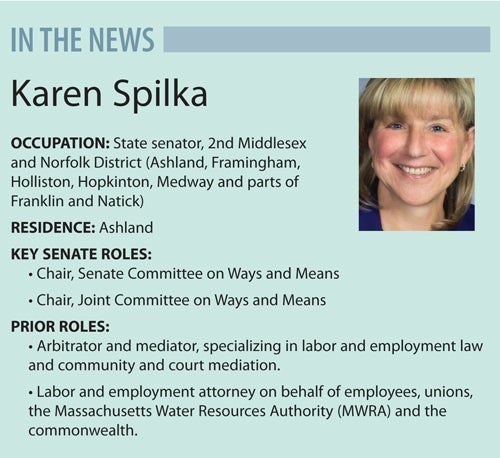In 2012, without much fanfare, the state passed a new tax on software. But when it took effect a year later, Sen. Karen Spilka started hearing outraged howls from the technology businesses that fill her MetroWest district.
The companies just couldn’t figure out how to implement the tax, Spilka said, and even the Department of Revenue couldn’t give them good advice on what to do.
“It became clear to me that this was an unworkable bill,” the Ashland Democrat said.
Spilka helped lead a successful charge to overturn the tax, but she also did something else. Working with the technology industry, she helped launch the Tech Hub Legislative Caucus. The caucus brings companies such as Hopkinton-based EMC Corp., Bedford’s iRobot and TripAdvisor of Newton together with legislators and others from state government.
With monthly meetings and annual “Tech Hub Days,” the group has sparked ideas that include a pilot program for computer science in Massachusetts schools. A recent Tech Hub “Idea-a-Thon” led to a new bill that would help startups sell their services to local municipalities.
Spilka said it’s crucial for high-tech companies to get engaged in government policy at all levels.
“Public policy will be made, and changes will happen, but we need the technology sector and the innovation sector to be at the table in the development of that policy so that what we end up with makes sense and is fair and is practical,” she said.
Spilka — who, as chair of the Senate Ways and Means Committee, is a key figure in ongoing budget negotiations on Beacon Hill — first got involved in politics because of her own desire to bring to the government table issues that were important to her. A lawyer and mediator, she also served as chair of the Ashland School Committee in the late 1990s, and she believed local communities weren’t getting the state funding they deserved. So she helped bring together a statewide group to lobby for changes in the state education funding formula.
She said it had never occurred to her to run for state office until her state representative announced his resignation in the middle of a term. Then, “within 10 seconds,” she decided to run simply because she thought she could get more done from inside the government.
Chamber leader: She knows business
Bonnie Biocchi, president of the MetroWest Chamber of Commerce, said Spilka’s background as a businesswoman — she was a chamber member when she had her own private practice — has made her a valuable ally in government.
“She understands the needs of business,” she said.
Biocchi said Spilka’s leadership in overhauling the state’s economic development infrastructure in 2010 and her support for regional development organizations have been valuable to local businesses. And she said Spilka’s background as a mediator also seems to make a difference in getting things done effectively.
“It’s not ‘my way or the highway,’” Biocchi said. “She sort of knows how to work out the best (solutions) to problems.”
In the current budget process, the Senate version that Spilka helped pass funds a number of programs that the spending plan proposed by Gov. Charlie Baker doesn’t. It would put more money into regional tourism councils, training and internships for the unemployed, and promotion of the life sciences, technology and manufacturing, as well as early childhood and college education.
Those policy priorities may seem all over the map, but Spilka said they all fall under the slogan she’s adopted for the budgeting process: “Lifting all families.” That includes boosting the technology sectors that provide good jobs and help grow the state economy, as well as supporting people facing hardships.
The ‘tech senator’
Tom Hopcroft, president and CEO of the Massachusetts Technology Leadership Council, said Spilka has probably done more than anyone else in the state Senate to bring his industry and government together.
“She’s very much sort of our tech senator,” he said.
Hopcroft said that, as important as Spilka’s support for initiatives focused on the tech industry is to the companies his group represents, her focus on issues of equality is also key. The technology industry may seem like it’s doing fine, Hopcroft said, with lots of fancy buildings and startup founders driving nice cars, but the state has the potential to make it far stronger. Currently, the industry can only call on the talents of a portion of the state’s residents, because of economic, educational and technical barriers facing many groups, including young people from poor families, people from communities outside Interstate 495, minorities and women.
“We need everyone who has an interest and a competence and a talent, and a lot of people have that,” Hopcroft said.
Right now, Spilka is continuing her work with the conference committee that tries to iron out differences between the House and Senate versions of the budget. Meanwhile, she said, Spilka hopes businesses — within or outside the technology sector — will continue to get engaged in the political process.
“It is so important that we hear their voice, whatever business they’re involved in,” she said. “It’s also important that they understand the public policy-making process.”

